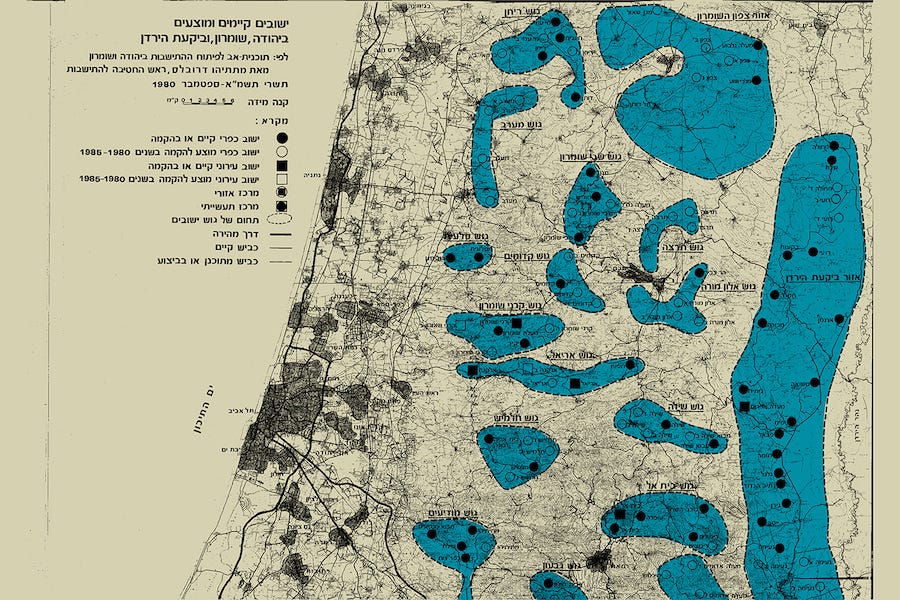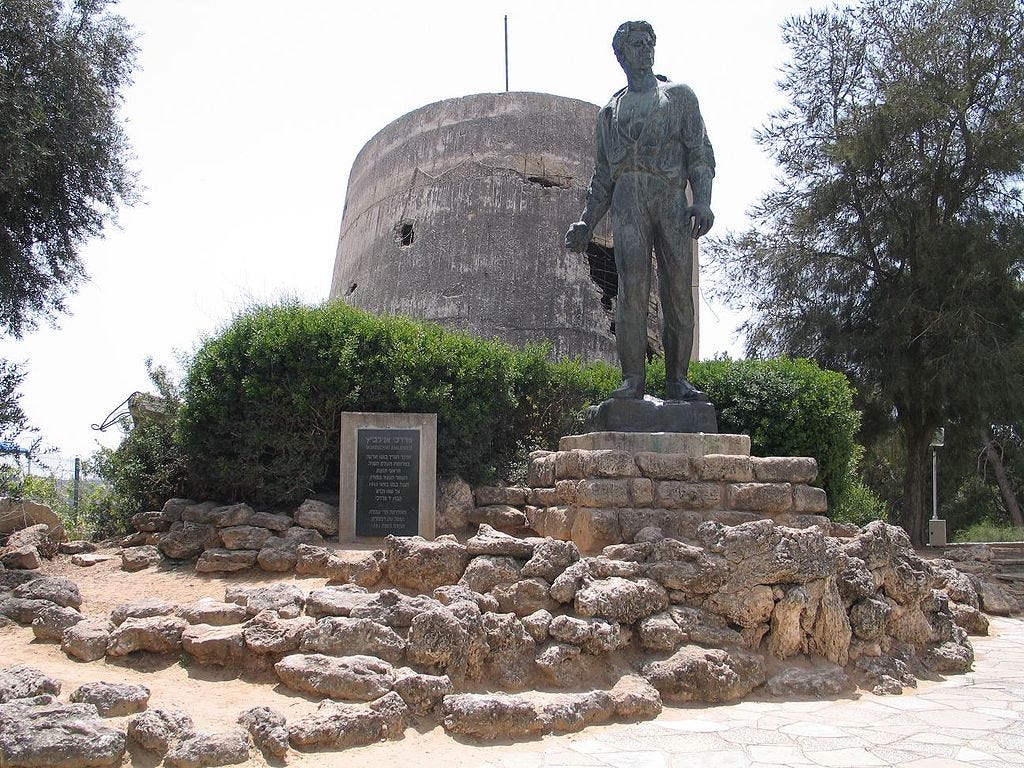Return to Gaza
Who’s Going to End This?
The Sayings of Abu Francis
I say, the child cries “He started it!” The adult asks, “Who’s going to end it?”
After I graduated from college, I spent a year abroad – mostly in the Middle East. For two months, I volunteered at Kibbutz Yad Mordechai, the last Israeli village you’d pass on your way south to the Gaza Strip and Egyptian border. Kibbutzes are collectively owned farms, originally founded as little socialist utopias decades before World War II. My first experiences in farming were laying drip irrigation lines, planting avocado trees, peeling cucumbers, tending chicken coops and washing dishes in a small cafe out along the Gaza Road.
Yad Mordechai was the spot where Egyptian armies halted their advance at the ceasefire declaration of the 1948 Arab-Israeli War. They left behind a tank and the bodies of dozens of Egyptian soldiers and kibbutzniks who died fighting over the land. A statue of Mordechai Anilewicz grasping a grenade welcomed tourists to the little museum that the kibbutzniks had built on that fateful meadow.
Gaza was just a couple miles down the road, originally a temporary refugee camp for Arabs fleeing their coastal towns in the face of advancing Israeli forces. The Strip, 25 miles long by six miles wide, had become a squalid slum of cinder block buildings complete with sewage running down the middle of streets. The refugees had not asked for the United Nations to partition their land and, even if they had, Gaza and the southern coast were not designated Jewish areas. Several generations of Palestinians were still waiting for Israelis and the rest of the world to honor international law and let them return to their historic homes.
I finally met some of these Palestinians after my stint at the kibbutz. During college, I had met a Jaffa-born professor named Ibrahim Abu-Lughod, who served on the Palestine National Council. In his class, I learned that the Arab-Israeli conflict was definitely a two-sided story – but as a good American Christian, I figured Israel was mostly right and the Arabs mostly wrong.
That changed after I met Abu Hanna, a Palestinian aid worker who helped the American Friends Service Committee improve agriculture on the West Bank. He also helped replace caved-in roofs down in Gaza with asbestos-reinforced concrete. The roof stopped leaking, but he was ashamed that’s all he was allowed to do for the 100-year-old woman who slept on rags on the floor. What Gaza needed was a major slum-clearance project, he said. What the West Bank businessmen needed was a loan fund without exorbitant interest rates so they wouldn’t have to smuggle Jordanian dinars across the border. But Israeli policy was to make life miserable for Palestinians so they would just leave the area altogether.

Things changed after I met Riah Abu El-Assal. Unlike Palestinians of the West Bank and Gaza, Riah was an Arab-Israeli citizen. This accident of history occurred when his hometown of Nazareth ended up inside the borders of what would be declared Israel in 1948. Riah, an Anglican bishop, was very concerned about the Israeli suburb of Nazareth Illit just north of the village. Israel was populating the homes and condos (usually referred to in the press as “settlements”) with Jewish immigrants hostile to Palestinians. He also talked about the Zionist program to Judaize the Galilee and de-Arabize the West Bank. Israel wanted the land but not the millions of Arabs that would come with it.
Nazareth had recently made some headlines by electing a Communist mayor, Riah’s good friend Tawfiq Ziad. “He is not a Communist,” Riah explained over tea so loaded with sugar it crystalized around the rim of the cup. “But Arab political parties are forbidden in the Knesset. The Communist Party is the only one capable of criticizing of Israeli policy. They allow it because many Jews belong to it.”
Then I met Adel Zagha, a senior studying business and economics at Birzeit University in Ramallah, just six miles north of Jerusalem. Adel was involved with the student government and told me of his frustration with college life under military occupation. The Israelis could shut the place down on a moment’s notice by simply citing threats to national security. Adel was involved with what amounted to a Palestinian Pride parade on campus. Moments after the students unfurled the Palestinian tricolor flag – black, white and green horizontal stripes overlaid with a red triangle – Israeli soldiers swarmed the campus, shut down the festivities, clobbered the kid carrying the flag over the head with it, and cancelled classes indefinitely.
Then I met Hana Manoly. I was a little lost roaming around the streets of Bethlehem on Christmas Eve when a short, stoutish young man called out to me, “Hello! You are American?” I guess it was obvious. I nodded, uneasy about what would come next. He introduced himself with a broad smile and proceeded to ask me if I would honor him by having Christmas Eve dinner at his house. I accepted the invitation and followed him through winding streets to a building and then up to the second floor. The house was packed with people and Hana explained that family living in Jordan had come back for the holidays. I was given a seat of honor in the middle of the long dining room table and Hana, sitting next to me, made sure my plate and cup were constantly filled. My heart was also filled with amazing joy at how a family with so little could afford to be so hospitable to a complete stranger.
In college, I was part of a movement to pressure South Africa to end apartheid, a system where European settlers oppressed and marginalized the indigenous population. It seemed to me Israel was running a very similar apartheid system. My Jewish roommates at the kibbutz and later in Jerusalem were very disturbed by this apartheid as well. Aaron was a pacifist from Uruguay who was jailed for refusing to sign a loyalty oath and serve in the Uruguayan army. He immigrated to Israel to escape oppression but had to serve in the Israeli army. He was a major when Israel attacked Lebanon in 1978. Troops systematically killed or displaced thousands of Muslims, letting the Christian Arabs remain to form a buffer zone on the northern border. When Aaron protested the killing of civilians, he was thrown in the brig.
So was Zamir, who served in the Israeli reserves on the West Bank. He was Jewish but had become a Christian – a “Messianic Jew.” He was a single housepainter, making enough money to pay the rent and then disappearing for days with a friend’s horse, camping in the Negev or on the West Bank. He detested the Israeli practice of beating and detaining random Palestinians on the street, confiscating their identity papers, then jailing them later for not having identity papers. Zamir served jail time for his refusal to obey orders involving harassment or unnecessary force.
When I returned to the States, I continued to make Palestinian friends. My next-door neighbor Sami had fled Jerusalem in 1948 to a refugee camp in Lebanon. When the Israeli government gave his family villa to Jewish immigrants, he left for Canada and then the U.S. I met Kamel, the owner of my favorite falafel place in Colorado Springs. His family fled Palestine to the United Arab Emirates, where he was born. They were considered outsiders by their Gulf neighbors and never embraced in the community. So they headed to the U.S., where Kamel still felt like a man without a country.
Fast forward to 2023 and I’m seeing the same old story come to a horrific end. Yad Mordechai has been evacuated. Gaza has been turned into a walled death camp, two million people cut off from the world in what could become the new Auschwitz. Palestinians are singing the same dirges of violence they learned from their traumatized Israeli masters. The world is being asked to take sides rather than take both sides to task for their respective violence and injustice. International law is nowhere to be seen.
Compassion must extend to all people, Jewish or Arabic, Christian or Muslim. If you don’t understand the crazy things Palestinians are doing, go ask your Palestinian friends to explain. If you are baffled by the crazy things Israel does, go ask your Jewish friends. If you don’t have any Muslim or Jewish friends, I suggest you go make one as soon as you can. (I recommend patronizing an ethnic restaurant or shop and asking for the owner.) Everyone’s been traumatized and everyone needs healing, not rhetoric and debate.
I say, the child cries “He started it!” The adult asks, “Who’s going to end it?”
What say you?



The way you closed rings true for me: we don’t need more debate, we need healing. This is one of the most absolutely convoluted conflicts in the history of humanity and there are a number of ways to interpret the history of the region. That being said, it pains me to have so many people, most of whom woke up yesterday to the suffering of both Palestinians and Jews, with such inflammatory opinions. What isn’t particularly complicated about this is that this conflict involves the innocent lives of many. It is not complicated to set down the pull of intellectualizing thing and just be with the hurt that is. Sometimes I think if people allowed the grief, I mean, really allowed it, clarity would follow. And it’s not just this conflict either. So many innocent people, incomprehensible numbers, have been killed in so many wars started by people who do not have a care for the citizens of this world. It is exceedingly clear that further war will not serve the beloved dead, their bereaved families, and the rubble left behind. I am Jewish, I have been a critic of the Israeli regime and their longtime treatment of Palestinian people. I am grieving. I am certainly traumatized. I see hatred from all angles now. It is very callous when people proceed with their “talking points” in the midst of such grief. We can’t conflate people with governments.
May peace prevail.
Israel is the Melting Pot for the One World Religion with no dogmas and no heaven, sort of like the Beatles song "Imagine". Israel, needless to say, was created over the protestations of the indigenous peoples, the Palestinians, by International World Jewry. The first immigrations began shortly after WW1, when the British Empire ignored its promises to Lawrence of Arabia et al to guarantee the creation of an "Independent Palestinian State" from the remains of the Ottoman Empire and rather allowed European Jews to migrate there. The next wave came courtesy of Rudolf Hess and the "Transfer Agreement" with Nazi Germany that saw thousands of German Jews emmigrate to the region. Then, of course, came waves of Jews after WW2 and a United Nations mandate which created the "State of Israel" in 1948. World Jewry cited a Divine Mandate from the Book of Genesis in the Holy Bible as the reason they could use any measure whatsoever, up to and including fraud, deceit, and outright terrorism, to evict residents from their ancestral homes.
Two wrongs never made a right, however, and so one cannot condone the Palestinians using similar measures against their new overlords. And so what has ensued is nothing but an escalating spiral of violence, hatred, and vandalism and murder.
All that being said, the current conflict seems most accurately to be between Al-CIAda's Useful Idiots and the Mossad's Nodding Yahoos. I don't think even the average occupant of Gaza nor Citizen of Israel has a proverbial dog in this fight, and certainly nothing to gain but another round of duck and cover.
Our Lady of Fatima, pray for us. You are our only hope!